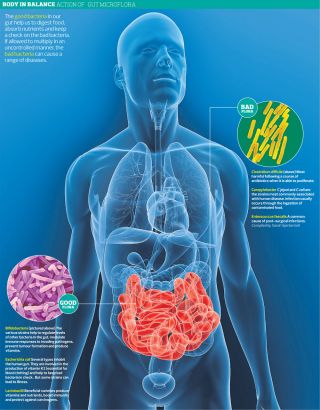In research circles the gut is often referred to as the "second brain". There are over 100 million neurons in the gut (more than the spinal cord or peripheral nervous system) and many contain the exact same neurotransmitters as the brain.

We know that the gut and mood are related—think butterflies in your stomach when anxious or a knot in your stomach when stressed out. This link is via the vagus nerve, a direct neuronal connection between the gut and the brain. In fact vagus nerve stimulation via an implanted electrode treats depression.
What’s new and exciting now are studies that indicate that bacteria in the gut are doing far more than simply digesting food and maintaining a healthy immune system.
Here is some background on recent findings related to gut bacteria:
Don't be put off by the term "bacteria" like it's a bad thing. Actually, there are over 100 trillion microorganisms living in the gut—vastly more than the number of cells in your whole body. These bugs weigh about five pounds, the same as your brain and perform a multitude of functions, much like other organs in the body.
Transplantation of good, healthy bacteria from one person’s gut to another is quick and inexpensive via endoscopy, colonoscopy or enema. This is essentially a “stool transplant”, but is more accurately known as fecal microbiota transplantation (FMT). FMT is currently used to treat life threatening infections, has a 90% cure rate and is being studied as a possible treatment for inflammatory bowel disease. Could weight loss be next?
Source: https://www.psychologytoday.com/blog/reading-between-the-headlines/201309/gut-bacteria-transplant-new-treatment-anxiety
No comments:
Post a Comment